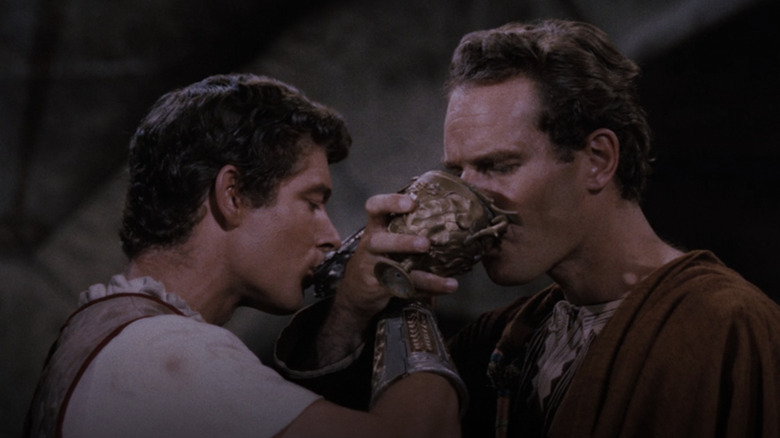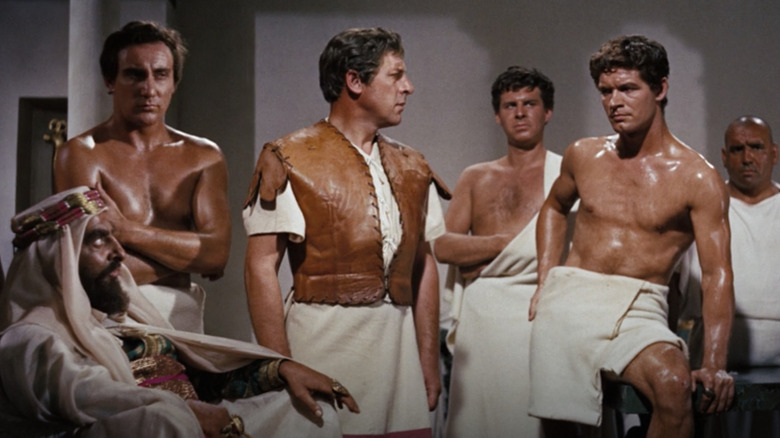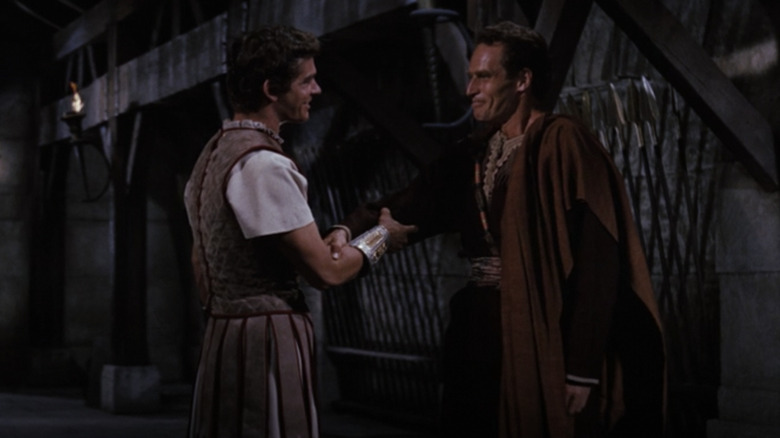Why Ben-Hur Sparked A Public Feud Between Charlton Heston And Gore Vidal
One of the first scenes in William Wyler's Best Picture winning film "Ben-Hur" is a reunion between the titular Judah Ben-Hur (Charlton Heston) and Messala (Stephen Boyd). During the scene, the two engage in a spear-throwing contest, and the spears end up just inches apart on this wooden cross beam. Messala says, "After all these years, still close," to which Ben-Hur responds, "In every way." Much of the scene is them embracing, locking arms, giggling at one another, and the capper to it all is them twisting their arms together to drink some wine. To plenty of people, this will just come off as a brotherly bond of some sort. For many others, it is obvious what is going on here. "Ben-Hur" may be a "Tale of the Christ," but Ben-Hur and Messala truly knew each other in a biblical sense.
Queer readings on films are nothing new. Finding that subtext is basically an entire industry at this point. If you look for it hard enough, you can probably find it in every single movie. A lot of the time, this is completely unintentional by the filmmaker. They make the film that is in their head, and audiences interpret it any way they see fit. However, there are plenty of filmmakers who do intend to include this queer subtext. Whether they are financially unable to make an explicitly queer movie or they just think it would be fun to hide this stuff, this underlying material can unquestionably enrich the filmgoing experience.
When it comes to "Ben-Hur," the intentionality of its queer subtext between Ben-Hur and Messala is really left up to whose side of the story you believe. On one side, you have Gore Vidal, one of the film's many screenwriters, who insists every bit of it is intentional, and on the other, you have the film's star Charlton Heston, who vehemently denies the insinuation. This clash led to public spat in the LA Times between the two almost 40 years after the film's release.
Dueling retrospectives
All of this started with the 1995 documentary "The Celluloid Closet." This film explores the explicit and implicit portrayals of LGBTQ+ people in the history of Hollywood film. One of the subjects interviewed for the film was Gore Vidal, a divisive, bisexual intellectual who wrote novels, plays, and films. Though uncredited for his work on "Ben-Hur," he says of the experience writing it:
"Ben-Hur and Messala, one Jewish, one Roman, had known each other in youth. They disagree over politics, and now they hate each other for the next three hours. Well, that isn't much to put a whole three hour movie on, even something as gorgeously junky as 'Ben-Hur.' Director of the movie, William Wyler, said, 'What do you do?' I said, "Well, look, let me try something. Let's say these two guys when they were fifteen, sixteen, when they last saw each other, they had been lovers, and now they are meeting again, and the Roman wants to start it up. Messala, played by Stephen Boyd, wants to start it up again with Ben-Hur, played by Charlton Heston. Heaven knows why, but he does.'"
Vidal says that after Wyler stared at him blankly for a bit, he then clarified that none of this would be made explicit. However, he thinks Wyler must tell Stephen Boyd of this subtext, but he should not tell Charlton Heston "because Chuck will fall apart." In the final film, you really do see everything Vidal says in the documentary, particularly in that first reunion scene. For me, that subtext is unavoidable in the screenplay and in Boyd's performance. Cut to him oiled up in a bathhouse later, and it's almost comical how the subtext doesn't feel much like "sub" at all.
After this talking head interview surfaced, Heston took to the press to write:
"Vidal, over the years, has made more and more extravagant claims of authorship. He was in fact imported for a trial run on a script that needed work. Over three days (recorded in my work journal), he produced a scene of several pages which Wyler rejected after a read-through with Stephen Boyd and me. Vidal left the next day.
Vidal's claim that he slipped in a scene implying a homosexual relationship between the two men insults William Wyler and, I have to say, irritates the hell out of me."
Vidal, never one to take the opportunity to let bygones be bygones, ended up writing his own response to Heston, detailing his own events of his work on the script, including dates and the marvelous zinger, "Now one does not expect truth to be exactly a shining Grail (I'm slipping back into Ben-Hurese) for a spokesperson of the National Rifle Assn. and the National Review, but downright lying is not ... well, wise, Chuck, is it?" No one could be more acerbically nasty than Gore Vidal.
Obviously, the two did not see eye to eye.
Does it matter who is right?
Too many people get hung up on authorial intent when it comes to interpreting a film. We live in a world where the auteur theory, the notion that the director is the author of a film, has taken hold, and we always want to ask directors and other people who work on the films what they mean. Why did they frame this shot this way? Why does this scene have a blue tint to it? Why, why, why? Ultimately, once the film is completed, it no longer belongs to the people who made it. People see a film, bringing their own unique life experiences and perceptions to it, and they determine what the film means to them. Those questions we ask the filmmakers are the ones we should be asking ourselves, engaging with the art through our own prisms.
Sure, asking Gore Vidal and Charlton Heston about what they were thinking when they were making "Ben-Hur" could provide some interesting anecdotes and perhaps enlighten you on something you may not have thought of, but ultimately, you get to make the final decision. Are Ben-Hur and Messala former lovers? The only person who can truly answer that is you.


